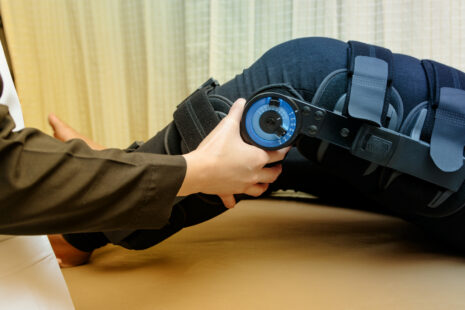Reducing inflammation in the hip can help alleviate pain and discomfort caused by conditions such as hip arthritis, bursitis, or tendinitis.
Here are some strategies to help reduce inflammation in the hip…
- Rest – Give your hip some rest by avoiding activities that worsen the inflammation or cause pain. Limit weight-bearing activities that put a strain on the hip joint.
- Ice Therapy – Applying ice to the affected hip can help reduce inflammation and numb the area. Use an ice pack or a bag of frozen vegetables wrapped in a cloth, and apply it to the hip for about 15-20 minutes at a time, several times a day.
- Anti-Inflammatory Medication – Over-the-counter nonsteroidal anti-inflammatory drugs (NSAIDs), such as ibuprofen or naproxen, can help reduce inflammation and provide pain relief. Always follow the recommended dosage and guidelines.
- Compression – Wearing a compression bandage or hip support can provide gentle pressure to reduce swelling in the hip area.
- Elevation – Elevate your leg and hip whenever possible, especially when resting or sleeping. Prop pillows under your leg to keep it elevated, which can help reduce swelling.
- Heat Therapy – While ice is generally recommended for acute inflammation, some people find that applying heat, such as a warm compress or a heating pad, can provide relief for chronic inflammation. Use heat for 15-20 minutes at a time.
- Physical Therapy – A physical therapist can provide exercises and stretches to improve hip flexibility, strength, and mobility while avoiding aggravation of the inflamed area.
- Weight Management – If you are overweight, losing excess weight can help reduce the load on your hip joint and decrease inflammation.
- Healthy Diet – Eating a balanced diet rich in anti-inflammatory foods, such as fruits, vegetables, whole grains, and fatty fish, can help support the body’s natural inflammation-reducing processes.
- Avoid Trigger Foods – Some individuals find that certain foods may exacerbate inflammation. Common trigger foods include processed foods, sugary snacks, and excessive alcohol. Try to identify and avoid these trigger foods.
- Consult a Healthcare Professional – If the inflammation persists or worsens, consult with a healthcare professional, such as a doctor or orthopedic specialist. They can diagnose the underlying cause of the inflammation and recommend appropriate treatment options.
While these measures can help reduce inflammation in the hip, they may not address the underlying condition causing the inflammation. For a comprehensive treatment plan, seek guidance from a healthcare professional to receive a proper diagnosis and personalized care.




